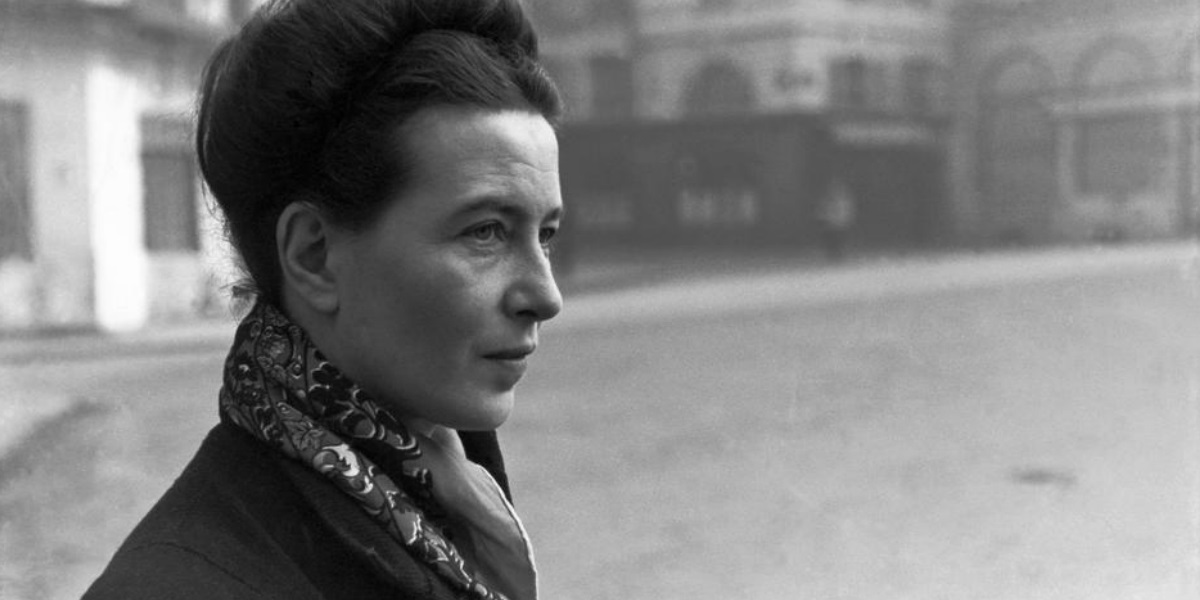One of the most important thinkers of feminism: Who is Simone de Beauvoir?
Simone de Beauvoir, who holds the fire of freedom of her period in the concept of women, blends existence and feminism.

French novelist and essayist. She covered the themes of existential philosophy and established herself as one of the leading feminist thinkers of the 20th century with her famous study of women. Simone de Beauvoir, the daughter of a Catholic bourgeois family, was born on January 9, 1908, in Paris, and completed her primary and secondary education in private Catholic schools. She studied philosophy at the Sorbonne. In 1929, while preparing for the final exams, she met Jean-Paul Sartre. This meeting, which she described as the most important event of her life, was the beginning of a relationship that lasted until Sartre's death. She started teaching in Rouen in 1930. She left her teaching job, which continued in Marseille and Paris, after 1943, when she began to earn her living as a writer.
Simone Lucie Ernestine Marie Bertrand de Beauvoir (9 January 1908 – 14 April 1986) was a French existentialist philosopher, writer, social theorist, and feminist activist. Though she did not consider herself a philosopher, and even though she was not considered one at the time of her death, she had a significant influence on both feminist existentialism and feminist theory.
A year after meeting Sartre, she established a relationship with Sartre, which denied traditional family relations such as marriage and childbearing, and was based on the principle of mutual respect for each other's freedom. This lifelong relationship is the application of both existential philosophy and Beauvoir's understanding of feminism to life. Along with Sartre, Beauvoir also rejected the values of the bourgeois environment from which she emerged and chose to be responsible for her age. She has always taken a stand for human freedom in front of the important problems of the age. Despite being close to Sartre and generally sharing the same attitude, she succeeded in being a free and independent thinker.
The author, who wrote her first works during and immediately after World War II, first dealt with the main themes of existential philosophy in her novels. Her first novel, l'Invitee (The Guest Girl), has autobiographical elements. It is about the deterioration of the relationship of a couple who have come to an agreement as a result of the prolonged sojourn of a young girl. The theme of the novel is that consciousness can only exist at the expense of another consciousness.
His second novel was Le Sang des Autres ("The Blood of Others"), published in 1944. The novel, which takes place in occupied Paris, deals with the problem of responsibility and freedom. The hero of the novel, who has to shed the blood of others for the sake of her own ideals, has to sacrifice himself in the end. Les Bouches Inutiles, written in 1945, is a didactic play on the rightness or the futility of sacrificing someone for the general good.
Tous les hommes sont mortels (“All Men Are Mortal”) is a historical novel set during the reign of Charles Quint (Charlie). Here, the theme that death gives meaning and form to life is handled.
Les Mandarins tackles the fundamental dilemmas of man in a more complex way. At the center of the novel is the story of a woman destroyed by love. The novel sheds light on the dilemma of taking political responsibility or preserving the status of the hunted in the intellectual circle of Paris in the political environment of the years following World War II. The author won the Goncourt Prize of the same year with this novel she wrote in 1954.
A great navigator, Beauvoir traveled to Greece, Italy, Central Europe, Egypt, the USA, China, USSR, Latin America, and Japan. She describes some of these trips in her travel notes. l'Amerique au joir le jour'dz reflects on her observations of the United States, and in la Longue Marche she introduces the Chinese revolution.
The author, who also deals with existential themes in her essays, published Pyrrhus et Cineas in 1944, Pour une morale de Pambiguite on Hegel in 1948, and Deuxieme Sexe in 1949. In this study, conducted from a philosophical point of view that defines woman as the "Other" according to the man who is the subject, the author suggests that women can gain their independence by defining themselves for themselves, not according to the man. The last of her essays is on old age, Viellesse, which she wrote in 1970. In this study carried out from an existential perspective, old age is the last stage of the disappearance of the struggle for existence, which is defined as man's transcendence of nature and her own nature. Aging is an enemy that stands before the view that the future is the only criterion that justifies the present.
Responsibility for her time prompted Beauvoir to write a large four-volume series of testimonies in the form of an autobiography. This work can be accepted as a history of the French intellectual life of the last fifty years. The first volume of the work, Les Memdires d'une jetine fille rangee (Memoirs of a Young Girl), chronicles her childhood years and her struggle to become an independent woman. La Force de l'age (1960) describes the pre-war period, La Force des choses (1963) describes the war and the postwar period. Les Temps Modernes, which Beauvoir published with Sartre after the war, and the political and intellectual debates around it are at the center of this volume.
In her autobiography, which forms a whole, the author presents her life as a successfully realized project.
